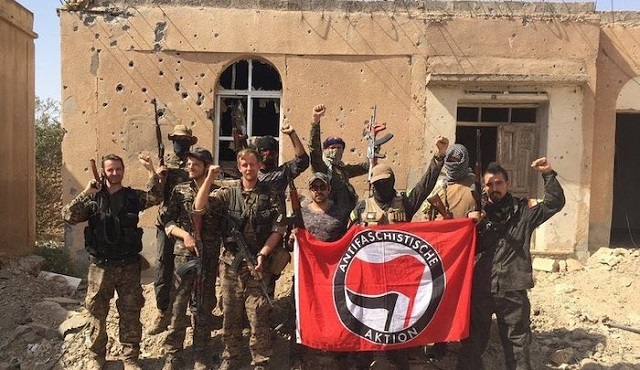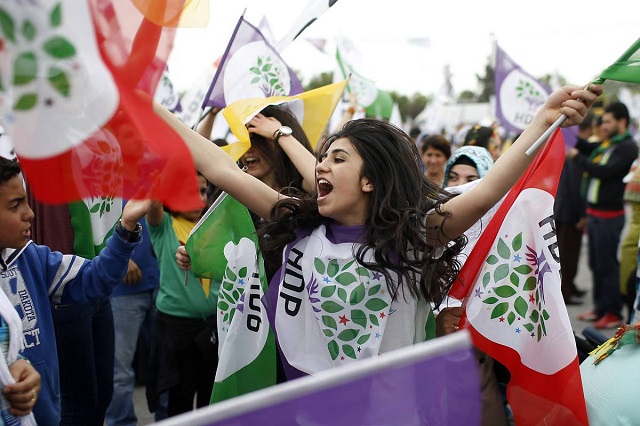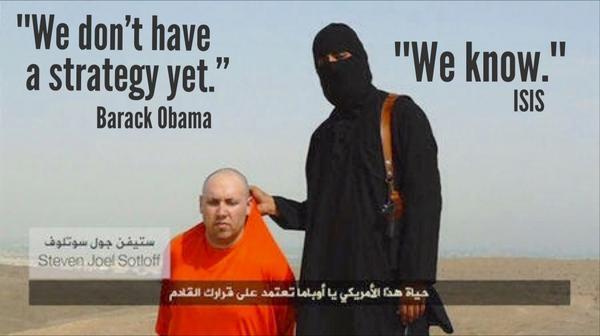In the Wall Street Journal Weekend edition, June 20-21, 2015, Yaroslav Trofimov writes of the possible rise of an independent Kurdistan, “The State of The Kurds”. An independent Kurdistan was promised by the WWI Allies in the Treaty of Sevres that ended the Ottoman Empire in 1920. That commitment was dashed by the rise of Turkish Republic under the secularist Kemal Atatürk confirmed in the 1923 Treaty of Lausanne denying an independent Kurdistan in what is now Eastern Turkey. Combined a future Kurdistan encompassing eastern Turkey, Northern Syria, northwest Iran and northern Iraq might comprise a landlocked republic of 30 million with significant energy and agricultural resources. The rise of Kurdistan is reflected in these comments in the Trofimov WSJ review article:
Selahattin Demirtas, Chairman of the HDP party in Turkey:
The Kurds’ existence was not recognized; they were hidden behind a veil. But now, after being invisible for a century, they are taking their place on the international stage. Today, international powers can no longer resolve any issue in the Middle East without taking into account the interests of the Kurds.
Tahir Elçi, a prominent Kurdish lawyer and chairman of the bar in Diyarbakir, Turkey:
In the past, when the Kurds sought self-rule, the Turks, the Persians and the Arabs were all united against it. Today that’s not true anymore—it’s not possible for the Shiite government in Iraq and Shiite Iran to work together against the Kurds with the Sunni Turkey and the Sunni ISIS. In this environment, the Kurds have become a political and a military power in the Middle East.
Elçi, amplifies a concern that Sherkoh Abbas, leader of the Kurdish National Syria Assembly (KURDNAS) has expressed in several NER interviews an articles with him:
The PKK has made important steps to adopt more democratic ways. But you cannot find the same climate of political diversity in [Kurdish] Syria as you find in [northern Iraq], and this is because of PKK’s authoritarian and Marxist background. This is a big problem.
As effective as the KRG government and peshmerga have been in pushing back at ISIS forces threatening the capital of Erbil, the real problem is the divisiveness in the political leadership. That is reflected in the comment of Erbil province’s governor, Nawaf Hadi cited by Trofimov:
For 80 years, the Arab Sunni people led Iraq—and they destroyed Kurdistan. Now we’ve been for 10 years with the Shiite people [dominant in Baghdad], and they’ve cut the funding and the salaries—how can we count on them as our partner in Iraq?” All the facts on the ground encourage the Kurds to be independent.
That renewed prospect reflects the constellation of events in Turkey, Syria and Iraq.
The fall of the AKP government in the Turkish Election of June 7, 2015
There was the stunning defeat of the 13 year reign of the Islamist AKP headed by President Recep Tayyip Erdogan by the trio of secular, nationalist and upstart Kurdish parties, the CHP, HNP and HDP that might form a minority ruling coalition 45 days from the June 7, 2014 parliamentary elections. These minority parties garnered a plurality of 299 seats in the Ankara Parliament. That is if these parties can coalesce. If not Islamist figurehead President Erdogan seek new elections if they can’t put together a new ruling government. A Washington, D.C. forum on what the results of the Turkish election convened by the Foundation for Defense of Democracies (FDD) forum presented nuanced views. Watch this C-Span video of the FDD forum.
FDD Senior Counselor John Hannah moderated the discussion with former U.S. ambassador to Turkey and FDD Senior Advisor former US Ambassador to Turkey Eric Edelman and FDD Non-Resident Fellow and former member of Turkish parliament Ayman Erdemir.
John Hannah
June 7 in my opinion was an inspiring performance, a much needed triumph of the spirit of liberal democracy in a Middle East landscape currently inundated with way too much bad news.
For those of us who have watched over the past decade with great dismay the slow drip of Turkey’s democracy being drained away by Erdogan’s creeping Islamism and authoritarianism, we frankly weren’t sure anymore if the Turkish people had this kind of an election in them.
Aykan Erdemir
My take-home message would be that we should not read these elections too much with a progressive, liberal-democratic interpretation. But we should not underemphasize the importance of it either, because ultimately June 7 proved to us that there could be a return from competitive authoritarianism, where an incumbent with huge advantages nevertheless can suffer a relative defeat in the ballot box.
I have always argued that Erdogan’s policies and politics cannot be interpreted within the nation-state borders. Erdogan’s policies right from the start have been transnational; it has always been a Muslim Brotherhood-oriented policy, whether in Syria, Jordan, or Egypt. He is a visionary transnationalist politician.”
Ambassador Edelman
Turkey is a deeply polarized society, and the bad news there is that the AKP is the only party that is competitive across the nation.
Erdogan will not see this vote in any way as inhibiting him in creating an executive presidency. …My suspicion is that Erdogan does not want to see a government formed within the 45-day period set by the constitution and would like to see the country go back to elections. He thinks that if he could apply the ‘keep voting until I get the right answer’ standard, there is a chance he will do better in a second election, get at least a governing majority if not the super-majority.
Dr. Harold Rhode, former Turkish and Islamic Affairs expert in the Office of the Secretary of Defense held a more optimistic view cited in a JNS.org article on the Turkish Elections, “noting that he personally knows pro-American and pro-Israel officials “within the senior leadership of all three of the [non-AKP] parties.”
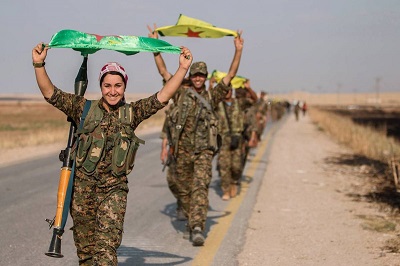
Syrian YPG fighters capture Tal-Abyad from ISIS, June 2015. Source: Reuters.
Syrian Kurdish YPG victory at strategic border town of Tal-Abyad
The second development was the victory by Syrian Kurdish PYG fighters , Christian Assyrian and secular FSA militias wresting the strategic border gateway of Tal-Abyad from ISIS with support from US coalition air strikes. This followed the January 2015 victory in the siege at the border city of Kobani. The Syrian PYG, affiliated with the Turkish PKK, a terrorist group designated by Turkey, EU and the US, whose leader Abdullah Ocalan is under house arrest in Turkey, has been assisted by fighting units of the Iraqi Peshmerga from the adjacent Kurdish Regional Government (KRG)in northern Iraq. The third development was the KRG Peshmerga wresting control of Kirkuk and its vast oil field. Kirkuk, as Trofimov noted is considered the “Kurdish Jerusalem” . Not to be outdone by Kurdish compatriots in Syria and Iraq, in mid-May 2015, Iranian Kurdish Party of Free Life in Kurdistan ( PJAK) forces in northwestern Iran’s Zagros mountain fought Iranian security forces in Mahabad. Mahabad was the capital of the short-lived State of Republic Kurdistan established with Soviet Russian support in Iran in 1945- 1946.
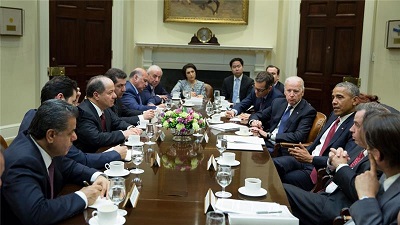
Kurdish President Barzani and KRG delegation meet President Obama and VP Biden May 2015.
KRG Meets with President to Free up Arms Deliveries
The KRG quest for independence has been stymied by the Baghdad government of PM Haidar al-Abadi. The Baghdad government has not lived up to its agreement reached in December 2014 to provide regular payments to the KRG amounting to nearly $5.7 billion in exchange for selling 550,000 barrels of oil. The result has been that KRG government and the 160,000 Peshmerga force have not been paid in months. More troubling has been the current agreements between the Obama Administration and the al-Abadi government for allocation and deliveries of heavy weapons that have not found their way to the highly effective Peshmerga fighting force. This is especially galling given the thousands of Humvees, mobile artillery, anti-tank, main battle tanks and MRAP vehicles abandoned by fleeing Iraqi national security forces in the conquest of Mosul in June 2014 and Ramadi in late May.
A meeting occurred in Washington in early May 2015 with KRG President Barzani and senior officials with President Obama, Vice President Biden and members of the National Security Staff seeking resolution of this impasse. Michael Knights of the Washington Institute for Near Policy wrote about this in a May 15, 2015 Al Jazeera, article, “A big win for Kurds at the White House”:
From May 3-8, 2015, Washington D.C. hosted a high-powered delegation from the Kurdistan Regional Government (KRG). KRG President Massoud Barzani was flanked by Deputy Prime Minister Qubad Talabani, National Security Chancellor Masrour Barzani and Minister of Peshmerga Affairs Mustapha Sayyid Qadr, among other KRG ministers and officials. [The delegation was originally scheduled for a five minute meeting with President Obama, instead the session lasted an hour].
In particular, the Kurds complained that Washington has allocated too small a proportion of its $1.6bn Iraq Train and Equip Fund (ITEF) assistance to Kurdistan.
Slow and indirect delivery of US weapons systems is a connected concern. Washington has chosen to funnel most weapons shipments via the federal Iraqi Ministry of Defense, the only entity entitled by US law to sign end-user certificates (EUCs) for the weapons.
[…]In reaction to these views, the House Armed Services Committee of the US Congress introduced clauses into the annual National Defense Authorization Act (NDAA), the Pentagon’s budget, in an attempt to protect the Kurds’ fair share of US weapons.
The draft NDAA for Fiscal Year 2016 was amended by congress to include a clause (Section 1223) that named the Peshmerga as one of a number of security forces collectively entitled to “not less than 25 percent” of the annual $715m of US support.
Most controversially the amendment would allow the KRG “as a country” to “directly receive assistance from the United States” if Baghdad failed to meet the aforementioned condition, a clause that sparked security threats from Shia militia leaders against US trainers in Iraq.
Baghdad protested the language, and US Vice President Joe Biden signaled one day before the Kurdish delegation landed that “all US military assistance in the fight against [ISIL] comes at the request of the Government of Iraq and must be coordinated through the Government of Iraq”.
[…]
Instead of trying to force the White House to do Kurdistan’s bidding through pressure politics, Barzani seems to have adopted a longer-term view in his dealings with the US on defense.
Section 1223 did not give the Kurds a great deal – sharing a quarter of US material collectively with Sunni Arab paramilitary recipients – but it would have soured relations with the Obama administration at a critical time.
Israeli Support for an Independent Kurdistan
One Middle East nation that supports an independent Kurdistan is Israel . As exemplified by comments from Israeli Prime Minister Netanyahu, Israel supports the creation of an independent Kurdistan in Iraq. There is a long connection between the Kurds and the Jewish nation. There is an estimated 150,000 Kurdish Jewish population in Israel that has fostered cultural –linguistic exchanges with Iraqi Kurdistan. Iraqi and Iranian kurds smuggled Iraqi Jews to freedom via Iran, during the days of the late Shah, to Israel and the West. Iranian Kurds continued that effort despite the Islamic republic facilitating the departure of Iranian Jews via Turkey to reach Israel. From the 1950’s to the mid-70’s Israel provided covert military training and equipment to Iraqi Kurds against the Ba’athist regime of the late Saddam Hussein. That ended with a treaty between the late Shah of Iran and Hussein orchestrated by Henry Kissinger in 1975. During the 1980’s Hussein took his revenge on Iraqi kurds during the Iran-Iraq War in a series of genocidal revenge campaigns including a massive gas attack that killed thousands decimating Kurdish villages. Israel currently hosts the huge U.S. War Reserve Stock for use in Middle East conflicts. Perhaps, the Obama Administration might relent on the current agreements with the Baghdad government and permit transfers from the US War Reserve Stock in Israel of much needed weapons, equipment and munitions to the Peshmerga in Iraq and the Syrian Kurdish militias fighting ISIS. Israel is less than several hundred miles from Erbil.
EDITORS NOTE: This column originally appeared in the New English Review. The featured image is of supporters cheering Selahattin Demirtas, co-chair of the pro-Kurdish Peoples’ Democratic Party, HDP, in Istanbul, Turkey, in May, 2015. Source: Emrah Gurel/AP.
